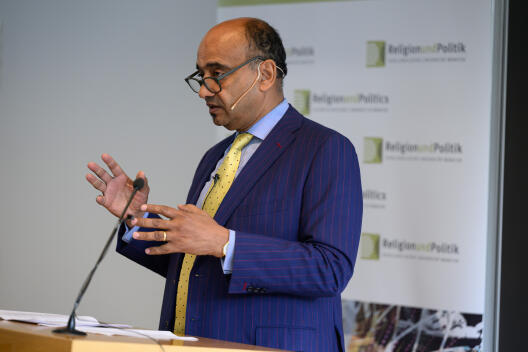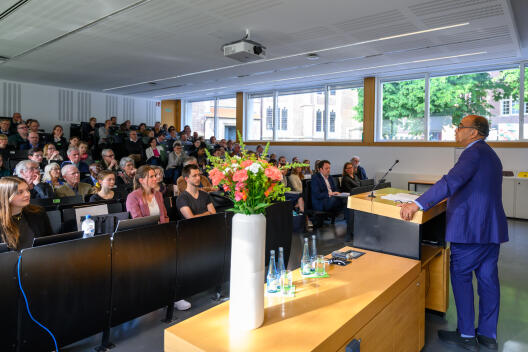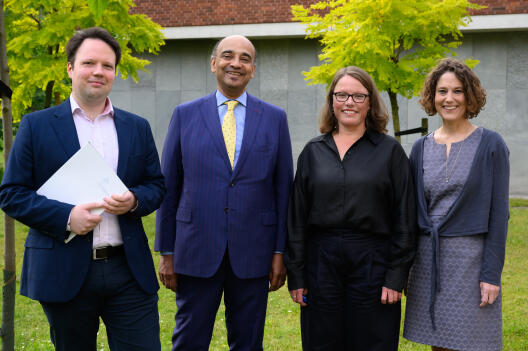US philosopher Appiah on identities and solutions to religious conflicts
US philosopher Kwame Anthony Appiah argues for a pluralism without relativism – Hans Blumenberg Lecture 2024 at the Cluster of Excellence

Press release from 14 June 2024
According to US philosopher Kwame Anthony Appiah, religious conflicts can be resolved through a pluralistic understanding of religious identities. “It is inevitable for societies to be multireligious today, and each community and each person should be able to follow their own path in terms of religious identity”, said the Blumenberg Professor at the University of Münster’s Cluster of Excellence “Religion and Politics” on Thursday evening. However, Appiah pointed out that this should not be equated with relativism. “I can think that my path is the correct one, while at the same time believe that another person is allowed to follow their path, even if I think it is incorrect. For me, that is the core of a cosmopolitan attitude. However, it requires a goodwill that is not necessarily widespread”.
In his lecture entitled “Ways of Belonging”, Appiah, who teaches at New York University, identified three different dimensions of religion: creed, practice and identity. In order to resolve or avoid religious conflicts, we should first establish which dimension is at the core of a conflict. Appiah illustrated this with many conflicts from the past and present: from disputes over interpretations of the Bible and Quran to religious practices such as the sign of the cross in Christianity and the tawhid gesture in Islam, and to various religious stances on, for example, homosexuality, animal welfare and violence. He pointed to conflicts both between religions and between their different currents, for example within Christianity, Islam and Hinduism.

According to Appiah, religious beliefs are not immutable truths; rather, they have always evolved. “The history of sacred texts has always been the history of their readers, whose interpretations change”. Today, interpretations are increasingly taking place in dialogue with other religious traditions, and it is possible to find more agreement in this dialogue in how people interpret texts than before. This can help to resolve conflicts. “However, those already hostile to people with a different religious identity will be tempted to adhere to an interpretation that hinders compromise”.
“There is often disagreement in religious communities over who belongs and who does not”
Even more important, according to Appiah, is everyday religious practice, which is usually detached from creeds. Whether making the sign of the cross or the tawhid gesture – even minor differences in the practice of prayer can help identify members of a particular denomination or community, as well as intruders from another. The practice thus determines membership of a religious group and becomes a marker of a person’s religious identity. Which practices and norms mark a group and which do not – this is often a matter of dispute. “There is often disagreement in religious communities over who belongs and who does not”.
Photos


© Exzellenzcluster „Religion und Politik“/Michael Möller 
© Exzellenzcluster „Religion und Politik“/Michael Möller 
© Exzellenzcluster „Religion und Politik“/Michael Möller 
© Exzellenzcluster „Religion und Politik“/Michael Möller 
© Exzellenzcluster „Religion und Politik“/Michael Möller 
© Exzellenzcluster „Religion und Politik“/Michael Möller 
© Exzellenzcluster „Religion und Politik“/Michael Möller 
© Exzellenzcluster „Religion und Politik“/Michael Möller 
© Exzellenzcluster „Religion und Politik“/Michael Möller 
© Exzellenzcluster „Religion und Politik“/Michael Möller 
© Exzellenzcluster „Religion und Politik“/Michael Möller 
© Exzellenzcluster „Religion und Politik“/Michael Möller
It is crucial that religious identities are not immutable beliefs, but rather “practices within communities that are open to change”. This makes change possible and conflicts avoidable. The Cluster of Excellence appoints top international researchers to the Blumenberg Professorship, who then bring innovative ideas to Münster. On Friday, Appiah also discusses with researchers from the Cluster of Excellence his notion of cosmopolitanism and his approach to deconstructing identities of faith, of skin colour, and of class affiliation. (vvm/tec)
Hans Blumenberg Professor Kwame Anthony Appiah
Born in London in 1954 and brought up in Ghana, Kwame Anthony Appiah has won many awards. After studying philosophy and completing his doctorate at Cambridge, he taught at Yale, Cornell, Duke and Harvard Universities before moving to Princeton University in 2002. He has been Professor of Philosophy and Law at New York University since 2014. Appiah’s works include books such as Cosmopolitanism: Ethics in a World of Strangers (W. W. Norton & Company 2006) and The Lies That Bind: Rethinking Identity (W. W. Norton & Company 2018).
Hans Blumenberg Professorship for Religion and Politics
Researchers from top international research institutions who bring innovative ideas to Münster are appointed to the “Hans Blumenberg Professorship for Religion and Politics”, which is named after the Münster philosopher Hans Blumenberg (1920-1996). This has included in recent years: Maribel Fierro (Consejo Superior de Investigaciones Científicas, Madrid, Spain), Sarah Stroumsa (Hebrew University of Jerusalem, Israel), Linda Woodhead (Lancaster University, United Kingdom), Jóhann Páll Árnason (La Trobe University, Melbourne, Australia) and Mark Juergensmeyer (University of California, Santa Barbara, USA).

